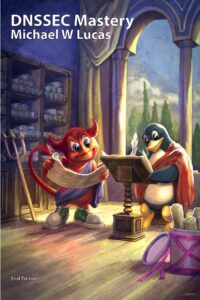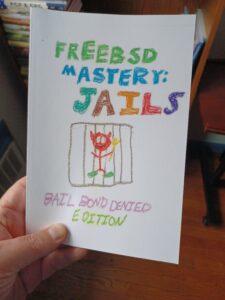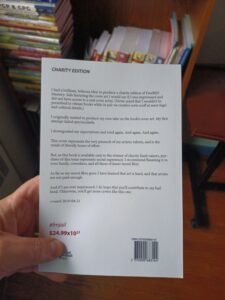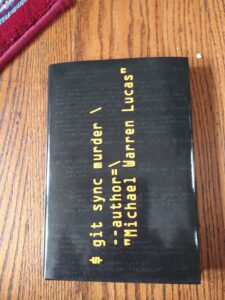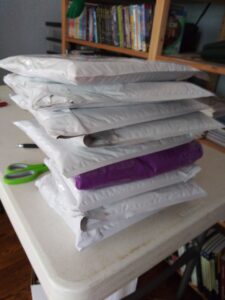Warning: publishing business book neepery ahead, as I try to figure out a problem. It includes a bunch of tedious ground-laying. I also round many prices to the nearest dollar.
I am specifically talking about nonfiction here. The fiction business is different. (That’s the problem.)
Amazon’s Payment Model
Amazon’s direct publishing program, KDP, is one of several distribution channels that allows writers to reach audiences without going through a publisher. KDP is the largest such distributor. In any business, the largest distributor uses its power to impose extra rules that benefit it. One of those is the ebook royalty structure, which is dictated by the ebook’s price. Ebooks priced up to $2.98, the author gets paid 35% of cover price for each sale. From $2.99 to $9.99, the author makes 70%. At $10 and up, they make 35% again. (Traditional publishers have a different structure.) Authors also pay delivery fees, so the actual payment is a little less than that. Amazon clearly wants ebooks to be priced between $2.99 and $9.99. Other distributors might have limits at the bottom end, but generally pay 65% to 80% — and nobody else has this artificial $9.99 cap.
Amazon agreements have a Most Favored Nation clause where they can price match any other distributor. If an ebook is $9.99 at Amazon and $4.99 at Apple, Amazon can cut their price to match.
If I price an ebook at $9.99, I make about $7 at any distributor.
If I price that same ebook at $14.99, I make about $10 everywhere but Amazon, and $4.50 at Amazon.
In short, ebook prices of $10-$19.99 are a “dead zone” that benefits nobody but Amazon. I must price my book over $20 to make more per sale than I would by pricing at $9.99.
Novels versus Tech Books
Tech books are fundamentally different from novels. Writing tech books takes a different skill set than novels, and the potential audience is different. Amazon treats the two identically, to tech authors’ detriment.
I can write a mid-size novel in about a month, barring debacle. (Yes, other writers are different, I know.) I spent about a year researching and writing SNMP Mastery and another writing TLS Mastery.
The maximum potential audience for each type of book is very different. A novel’s maximum potential audience is effectively unlimited. It might sell ten copies or fifty thousand copies. A lucky few sell millions. The maximum potential audience for a tech book is far, far smaller. I will be thrilled to unreasoning giggles if SNMP Mastery sells five thousand copies.
Every author knows this going in. $ git commit murder might sell a million copies. It won’t, of course, but it might.
Compare a $5.99 novel ($4 payment) to one of my $9.99 ($7 payment) tech books. Fifty thousand readers for that novel nets about $200,000. My five thousand readers at $7 each is about $35,000. That is not much for a year’s highly skilled work.
Kindle Unlimited
Amazon really pushes authors towards their Kindle Unlimited program. This is a flat rate subscription program, where authors get paid on the number of pages read. Books must be exclusive to Amazon, however. If someone reads a novel, they read every page. If someone grabs a tech book, they might read only one chapter. I design my books to be read from front to back, letting the reader build a comprehensive body of knowledge on the topic, but I know dang well some of you read one chapter and fuddle through without context. The KU program as it is currently structured is hostile to authors and non-Amazon readers alike, and I will not participate. That post is several years old, but the basics haven’t changed.
Additionally, I can destroy the career of any author in KU by setting up my own instance of scam software and aiming it at them. It would cost a couple hundred bucks of cloud computing and a couple days of my time, sure, but any number of the folks I’ve pissed off by insisting that women exist in tech would gleefully pay that to take me out. (As an aside, that’s the same reason my print books are non-returnable despite several bookstores requesting otherwise. I don’t know that enough of my haters are adept enough in the publishing biz to run the Returnable Books Exploit, but I can’t take that risk.)
Finally, consider the word monopsony.
The smaller maximum audience size, combined with techie reading habits, makes Kindle Unlimited absolute death for my tech books.
Mastery Book Goals
Most tech books are huge. I wanted to write shorter tech books that dive deeply into narrow aspects of system administration. I saw a gap that $9.99 ebooks would fill nicely. The books would be about 30,000-45,000 words each, and cover what every sysadmin must know about the material. The argument over whether or not the books achieve that is best had over a drink, but that’s the goal.
Some of my topics were poorly chosen. SNMP Mastery wound up at over 60,000 words. I looked at the completed book and thought: a fair price on this would be $14.99. If I do that, though, I make less on each ebook sale at Amazon. I might figure out how to survive that. I would not survive thinking of Amazon making more off my work for purely arbitrary reasons.
The books must be fairly priced, both for you and for me. I won’t ever get wealthy writing tech books, but if I don’t pay the bills I’ll have to go to work for someone else. They must be a win-win purchase.
Long Term Pricing
Prices increase over time. This is not a surprise.
Consider the cost of tech books through the years. Ebooks should not be priced the same as print books, and booksellers discount print books, but print books have the MSRP on the cover so they’re a decent yardstick for measuring scale of change. My books Absolute BSD, Absolute FreeBSD, and Absolute OpenBSD are all about the same size and have similar audiences.
These books cost $39.95 in the 2000s, and $59.95 in the 2010s. I expect them to hit (ugh) $79.95 in the 2020s.
Amazon is fairly rare among dot-coms in that it started off thinking very long-term. Its long term goal is to make books inexpensive, just like they make everything inexpensive. They’re not looking at 2021, they’re looking at 2030 and 2050.
Why would they ever eliminate the dead zone? Keeping it fits their long term goals. I would like to be wrong, but I’m pretty confident the $9.99 hurdle is perpetual.
The Future
Writers might not need pants, but we do need health care and gelato and caffeine. The price of the Mastery ebooks must eventually increase, along with everything else. This change is not imminent, but I can see the day approaching and am considering strategies against it.
My main options for “price increases above $9.99” seem to be:
- Drop Amazon Kindle for all new books. Amazon’s print book description would have near the top: “Due to Amazon’s discriminatory treatment of technology authors, ebook versions are available everywhere except Amazon.” I don’t know how long that note would survive, but I would take great satisfaction in posting it. It might alienate Kindle fans, though.
- Increase prices into the $10-$19.99 dead zone, and hope that my proceeds on other distributors overcome my Amazon losses. Theoretically possible, but rewards Amazon for discriminating against tech book authors.
- Artificially increase the price above $20 on all platforms. If I need to make $10 on each ebook sold at Amazon, I could increase the ebook price to $30. Thanks to the Most Favored Nation clause, the price must be identical on all platforms. I think $30 is an unfairly high price for SSH Mastery or even the overly long SNMP Mastery. Not a win-win, I won’t do it.
Other options do exist, like release windows, but these are the primary strategies. Of them, numbers two and three are unacceptable.
Decision Factors
If you look at my 2020 income, Amazon is my single biggest source, at 36%. My Amazon sales are pretty evenly split between print and ebook. Let’s call it 18% each. Taking an 18% pay cut would suck. Some of those readers would buy elsewhere, sure, but businesses must be pessimistic. For my calculations, and my laziness, let’s say Kindle is 20%.
(Dear tech author friends: don’t use my numbers. What percent of your sales are on Kindle? Do you know? And yes, I’m a freaking unicorn, I get it.)
Let’s say I write another tech book that should be priced fairly at $15, and examine it in three scenarios based on a baseline 1000 ebook sales.
Scenario 1: I price this book at $9.99, and sell 1000 ebooks across all platforms. I make $7 per book, and make $7000.
Scenario 2: I drop Kindle. I make $10 on each sale through every platform except Amazon, but sell only 800 books. I make $8000.
Scenario 3: I keep Kindle, but price at $14.99. I make $8900, at the price of feeding Amazon’s anti-tech-author discrimination. Plus, they make about $2000.
Is my annoyance at Amazon’s bottleneck practices worth $900? Is reader convenience worth $900? How about the two of them combined, against an “I win, you win, Amazon WINS BIG” situation? Good questions.
So what’s my actionable plan?
- Write shorter tech books that can be fairly priced at $9.99. (We all know how I will fail, but it’s a goal.)
- Watch inflation.
- Continue disintermediating readers.
- Steer readers that cannot be disintermediated to distributors other than Amazon.
I wrote this post to try to figure out the Kindle exit conditions. I guess I’ve already hit them. Or, I sell out for a few hundred bucks. Those folks who know the technologies I write about will understand that ethics matter to me, though.
This might get interesting…

